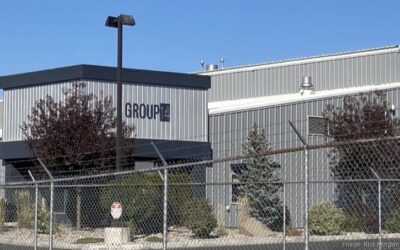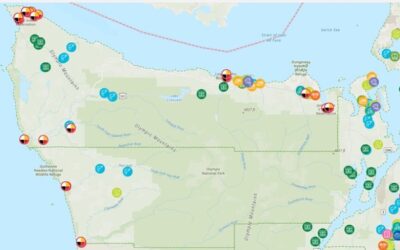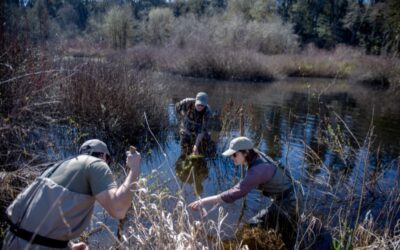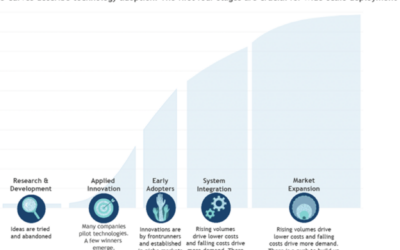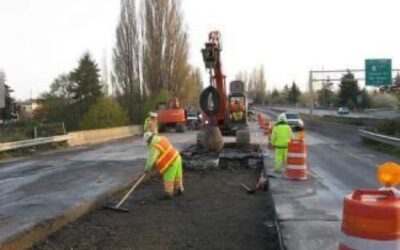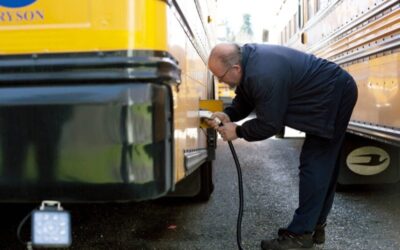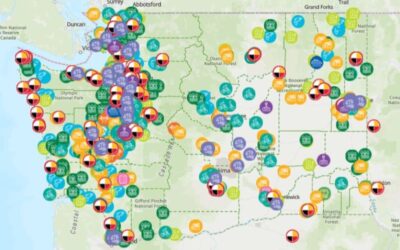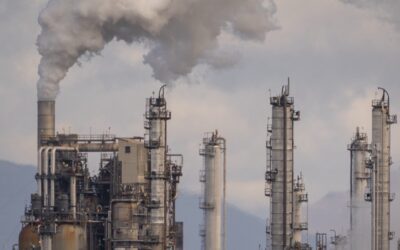Climate Commitment Act
History
History
The Climate Commitment Act stands as a remarkable example of effective state-level policy aimed at mitigating climate pollution and fostering a fair and sustainable future.
Back in 2021, Washington State took a pioneering step by passing the Climate Commitment Act (CCA), a groundbreaking cap-and-invest legislation. This forward-looking law places a gradual limit on climate-warming emissions and allocates resources to implement solutions that promote equity, prosperity, and resilience across the state. Working hand-in-hand with other robust state policies, the CCA is projected to achieve an impressive 95% reduction in emissions by 2050. Moreover, it fosters stronger consultations with tribal nations, enhances air quality and environmental justice, bolsters climate-focused initiatives, and bolsters the state’s economy.
The journey toward passing the CCA holds valuable insights that can be adapted by other states seeking to address climate change. Prior to this achievement, numerous attempts to implement carbon pricing had faltered over the course of more than a decade. However, the CCA triumphed with the collective backing of a diverse coalition of stakeholders, representing a broad spectrum of interests within the state. This inclusive collaboration ensured that the law not only met science-based emission reduction targets but also brought about positive co-benefits for Washington’s environment, businesses, and marginalized communities.
Bipartisan Roots & State Leadership
Cap-and-Trade was first deployed by the George H. W. Bush administration to successfully – and efficiently – combat acid rain.
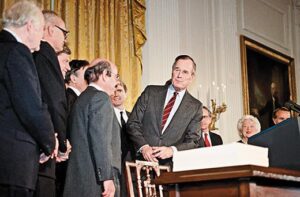
Charles Tasnadi / AP Images
Could it work as well on the climate crisis?
California was the first state to put Cap-and-Trade to work on greenhouse gas (GHG) reduction. Results there show targets achieved ahead of schedule, with a healthy economy.
Now, just as we in Washington state followed California’s lead but improved upon their program, we anticipate other states will follow our lead. Already, the state of New York is beginning the process of implementing a similar Cap-and-Invest system. California is considering improvements to their system by referencing Washington’s CCA.
Honored to stand w/ @JerryBrownGov he signs extension of cap & trade where we launched the program 11 years ago - a great bipartisan bill. pic.twitter.com/Xf91TbZXjX
— Arnold (@Schwarzenegger) July 25, 2017
The Stranger’s Endorsements for the November 5, 2024 General Election
Initiative Measure No. 2117NoThis initiative would repeal the Climate Commitment Act (CCA) and prohibit the state from ever implementing a similar law, cutting billions of dollars in funding for transit programs, ferries, clean energy projects, air...
We got a glimpse of the future
Last month, delegates on the Made in Washington Study Mission hosted by the Clean & Prosperous Institute got a sneak peek at a major new development: Amazon announced today that they will partner with Energy Northwest to develop four Small...
Environmental Defense Fund: New modeling shows the power and potential of cap-and-invest in Washington state
Washington state’s cap-and-invest program, created in the 2021 Climate Commitment Act (CCA), is nearing the end of its second year and has already raised over $2 billion for communities by putting a price on pollution. Read more...Clean &...
Puget Sound Business Journal: Moses Lake faces power crunch amid manufacturing boom
Well-funded battery tech companies like Group14 and Sila have planted their flags in Moses Lake. The small central Washington town now has to find a way to meet their power needs. Read more...Clean & Prosperous Washington is a project of the...
Tonight, beware of the misdirection play
As the Seahawks face the 49ers tonight at Lumen Field, Seattle’s defense will be ready to recognize fake handoffs, double-reverses, and flea-flickers. At the same time, Climate Commitment Act architect Reuven Carlyle will be ready to defend against...
The Leader: Understand what’s at stake with Initiative 2117 and vote no
It’s difficult to imagine an election season more politically fraught, or with higher stakes, than what we’re enduring this year. Understandably, folks are mostly focused on the national stage, but there are critical issues on the Washington state...
Sightline Institute: (Re)explaining Washington’s Climate Commitment Act
In 2021 Washington enacted the Climate Commitment Act, becoming only the second US state (after California) with an economy-wide cap-and-invest program. With the passage of the Climate Commitment Act, Washington also put in place its primary...
Columbian: Clark County could lose millions of dollars for projects if voters OK I-2117 to repeal cap-and-invest
Environmental projects in Clark County stand to lose millions of dollars generated by the state’s cap-and-invest program if voters repeal it in November. Washington’s 2021 Climate Commitment Act set a limit (or cap) on overall carbon emissions....
Visit the County Fare
Blue-ribbon, green economy projects are being showcased in every county of the state, all made possible by Washington’s Cap-and-Invest Climate Commitment Act (CCA). Yet there is a very real risk of losing the progress those investments are bringing...
The risk of repeal is real – and far-reaching
If you – like us – value clean air, clear water, and healthy farms, forests and fisheries, then you – like us – value the investments made possible by Washington’s Cap-and-Invest Climate Commitment Act (CCA). And you recognize the very real risk of...
Seattle Medium: Study: Initiative 2117 Could Cost Washington 45,000 Jobs And $9.1 Billion In Economic Output
A new study by Greenline Insights has revealed that if passed, Washington’s Initiative 2117 could result in the loss of approximately 45,000 high-wage jobs and $9.1 billion in economic output over the next eight years. The initiative, which has...
Cap-and-Invest is a Force Multiplier
Climate instability is widely recognized as a threat multiplier. More wildfires, Deadlier heatwaves. Higher insurance rates. Increased threats to national security. A recent report by the Defense Science Board concludes, “Climate change will likely...
Center Square: Fact check: Critics say Initiative 2117 would cut transportation funding
A new report published by Greenline Insights, along with proponents of the Climate Commitment Act, claims that if Initiative 2117 is approved by voters and repeals the law, it would deprive the state of state revenue by $3.9 billion through 2029....
Everett Herald: Editorial: I-2117 no bargain for climate, transportation; vote no
The slogan, “Vote yes, pay less” is catchy; we’ll give it that. But the rhyme in the slogan that seeks a yes vote for Initiative 2117 hides the truth that would follow with its passage; in loosened restrictions on industrial pollution; backtracking...
Lynnwood Times: Interactive map now available showcasing CCA projects at risk if I-2117 passes
The Clean & Prosperous Institute, a fiscally sponsored project of the Washington Business Alliance Fund set on reducing greenhouse emissions in Washington, launched a risk of repeal map intended to showcase how Climate Commitment Act (CCA)...
Spokane Public Radio: Advocacy group wants voters to keep WA climate law
Supporters of Washington's Climate Commitment Act are trying to convince the state’s voters not to repeal the program this fall. The act creates specific cap on emissions. If polluters go beyond those levels, they have to purchase allowances...
Washington State Standard: Washington climate auction prices remain low as repeal vote looms
Washington’s largest air polluters snapped up all available carbon emission allowances in this month’s state-run auction – and they did so at a relatively low price for a third consecutive time. The Sept. 4 auction was the last regular sale before...
San Juan Islander: Report: WA’s cap-and-invest program could add 45,000 jobs, $9 billion
Washington's clean energy law could bring thousands of jobs and billions of dollars to the state, according to a new report. Greenline Insights' analysis of the Climate Commitment Act, the state's cap-and-invest law passed in 2021, finds it will...
Seattle Bike Blog: Cascade: ‘Vote NO on I-2117 if you love bikes and trails’
One of the most important choices on November’s packed ballot will be rejecting I-2117, an irresponsible initiative backed by a wealthy conservative hedge fund manager that would obliterate funding for a laundry list of great things Washington...
Gaslighting at a gas station
Are I-2117 promoters selling cheaper gas, or snake oil? At a gas station in Federal Way today, they tried to claim that Washington’s cap-and-invest Climate Commitment Act is the reason our state’s gas prices are above the national average. It’s...




